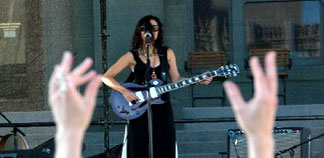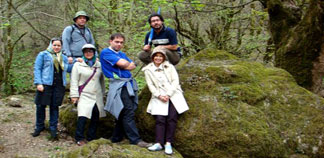به زبان فارسی
PICTORY
LATEST MUSIC
SEARCH
LOVE
24-Jul-2008 (6 comments)
برای من مهم این نیست که راه امرار معاش تو چیست. من میخواهم بدانم تو چه چیزی را با تمام وجود میخواهی و آیا جرات تصور رسیدن به عمیقترین خواستهایت را داری. برای من مهم این نیست که تو چند سال داری. من میخواهم بدانم که آیا تو حاضری به خاطر عشق، به خاطره ارزوهایت، برای تجربه کردن زنده بودن ریسک کنی که افسر گسیخته و دیوانه به نظر بیایی. برای من مهم این نیست که اختر شناسان در آینهٔ اقبالت چه می بینند. من میخواهم بدانم آیا تو مرکز حزن خودت را دریافته ی، آیا در رو یا روی با نا به حقی زندگی پذیراتر شده ی به زندگی، و یا جم و بسته شدی از ترس درد بیشتر! >>>
IRANIANS
23-Jul-2008 (23 comments)
“Zerangi” in Persian can be loosely translated as “cleverness” and to be “zerang” is to be “clever”. Most, if not all the time in Iranian culture and society, a zerang person is seen in a positive light for he or she is intelligent, resourceful and independent/autonomous and is thus what most Iranians strive to be. To be a zerang person can be applied in many situations, both positive and sinister. For example, a person who knows how the American legal system works and is able to work it to his or her advantage is zerang. A person who is resourceful in business and has made something of himself/herself is zerang. However, a person who is able to cleverly cheat his taxes and screw the system and government is also zerang. >>>
CITIZEN
23-Jul-2008 (10 comments)
Mirza Mohammad Ali, better known as Hajj Sayyah (meaning the traveler), was born in 1836 in the town of Mahallat in Iran. His studies exposed him at a young age to modern and democratic ideas that were at the time spreading throughout parts of the world. The stark difference he observed between the treatment suffered by most Iranians under their autocratic rulers and the ideas he studied inspired him to see the rest of the world. At the age of 23, Hajj Sayyah embarked on a remarkable journey around the globe that would last for nearly 18 years. He began his travels by wandering throughout Central Asia and Europe for more than six years. Often he traveled alone and in poverty>>>
HEJAB
23-Jul-2008 (2 comments)
استفاده از متد ِميشل فوكو (1984 ـ 1926) در بررسی مساله جنسیت و در امر حجاب احباری، چشمانداز نويني در نگاه فلسفی و جامعهشناسانه برویمان می گشاید. فوکو به خاطر نظریاتش درباره جامعه، سیاست و تاریخ از سرشناس ترین متفکران قرن بیستم است. فوکو جزو رهبران نظری پسا ساختگرایی و پست مدرنیته محسوب می شود. جهان خارج از متن، خود بخودی فاقد معنا و حقیقت است. زبان، سخن و گفتمان، شكلدهنده واقعيات هستند و جهان خارج صرفاً از طريق زبان و سخن شناخته ميشود. قوکو نشان ميدهد كه نظام زبان تعيين كننده فرهنگ و معناست. مضافا او نشان ميدهد كه چگونه كاربرد زبان يا گفتمان، همواره با كاربرد قدرت همراه است. نهادهای اجتماعي در چارچوب گفتمان، قدرت و کارکردهای اجتماعی خود را مستقر می سازند>>>
MEMORIES
22-Jul-2008 (3 comments)
If Afghanistan is the poorest country in the world and Nigeria the most religious, our community was like Afghanistan inhabited by white Nigerians! With the exception of a few, our neighbors were not monetarily any better off than we were. Most other houses were not any fancier than ours. Privacy had no safeguard in our community, personal and confidential information could be disclosed routinely. We used to know almost everything about our immediate neighbors from garlic to onion so to speak. At the other side of our house lived two families in the same house, a brother, Mashdi Esmaeel, in his sixties, with his wife and many kids in one side and his sister, Fatemeh Sultan with her kids on the other. >>>
ACCOUNTABILITY
22-Jul-2008 (68 comments)
This summer, thousands of bereaved families will defy the Iranian government and gather at the mass graves in Tehran’s Khavaran cemetery to mark the twentieth anniversary of the 1988 massacre of Iranian political prisoners. If you have forgotten this grim anniversary, then you are not alone. In fact, you are not alone if you did not even know that such a massacre ever occurred. In scale and brutality, the 1988 massacre is unparalleled in contemporary Iranian history. It is the darkest irony of this very dark episode, that of all its human rights violations the Iranian government has been most successful at keeping the 1988 killings a secret from the international community and from many Iranians>>>
ANSWERS
21-Jul-2008 (4 comments)
On July 17, 2008, Iranian.com posted an item entitled “Hopes and Concerns,” signed by Soudabeh Bashirrad (which may be a pseudonym). The article generally welcomes the formation of Public Affairs Alliance of Iranian Americans (PAAIA), admires it for having brought together Iranian Americans of diverse views, and praises PAAIA for taking steps to serve the community. We applaud the author for acknowledging PAAIA’s significant accomplishments during its short history. Unfortunately, the article also contains statements that, at best, reflect serious misperceptions and factual inaccuracies. The “questions” asked about PAAIA may essentially be divided into three categories>>>
IDEAS
21-Jul-2008 (2 comments)
Islam, like any other religion, has to wear the national dress of the people in order to enter a new land. The strict fundamentalists see only the religious dogmas and try to suppress the expression of any cultural nuances within the religious form. But life gradually removes their illusions and covers the religious dogmas with local colors. It seems that V. S. Naipaul, in his trip, was mostly surrounded by Islamic fundamentalists, especially the Wahhabi type. He takes the Wahhabi's approach toward Islam and extends it to all islamic factions. In Afghanistan, the Taleban destroyed the twin Buddha on Bamian rocks, but the Zoroastrian fire temples in Iran, and the holy Buddhist sites in Indonesia, still stand and resist religious conformity.
>>>
MISSING
21-Jul-2008 (one comment)
. پریشبا بود که سر میز کلی آدم نشسته بودند چند نفر اصلا مجبور شدند برند یک گو شه دیگه بشینند چون جا نبود. یکهو نگاه کردم و دیدم صندلی جلوییم خالی هست همه از کنازش رد میشند و کسی نمیببیندش .خواستم یک چیزی بگم اما کور که نبودند. لابد کسی نمیخواست اونجا بشینه و یا شاید هم مثل همیشه چشمهای من آلبا لو گیلاس می چید. نمیدونم چرا همیشه وسط این شلوغیها چشمم میافته به یک صندلی خالی که هیچ کس رویش نمی نشیند.یک موقعی فکرمیکردم بالاخره پر میشه , اما حا لا می بینم که نه انگارهرکس جای خودش رو د ا ره>>>
CYRUS
19-Jul-2008 (33 comments)
First came the 300 Spartans; and now the Spiegel article! The 300 were bunch of good looking and brave guys who fought this vast army of nasty looking and savage Persians. Ok. I can take that; even though from that savagery not much is left in me. In fact I could've really used a bit of that when confronting my neighbors, kids, manager, lender, ..., and above all my wife! But all that looks a distant dream now :-) But what has kept me going in the last few decades is the fact that the first human rights charter has been attributed to Persians. The Cyrus Cylinder, which is a magnificent ancient piece if nothing else, is supposedly inscribed with the human rights charter as decreed by the king of Persia, Cyrus the Great>>>
ANTS
19-Jul-2008 (5 comments)
همین که یکی دو روزی در حال و هوای این جزیره و میان مردم زندگی کنی و ... بی اختیار به یاد مورچه ی آرژانتینی "ایتالو کالوینو" می افتی. راوی داستان همراه همسر و فرزند خرد سالشان برای سکونت به شهری آمده اند که از پیش نمی شناخته اند. روز اول در آشپزخانه و بعد در ننوی بچه متوجه ی مورچه ها می شوند و کم کم در می یابند که مورچه ها در همه جای خانه حضوری پر رنگ دارند. راوی به خانه ی همسایه می رود تا برای دفع مورچه ها دوایی موقتی بگیرد. متوجه می شود که همسایه با وجود کار شبانه روزی و بکار بردن انواع و اقسام سم دفع مورچه از مایع و جامد و خوراکی های آلوده به انواع سم، به همین دلخوش است که در راهروها و اتاق ها و حیاط، میان انبوه مورچه ها مسیر باریکی برای رفت و آمد خود و همسرش داشته باشد!>>>
BASE
17-Jul-2008 (39 comments)
Maybe statistics would prove me wrong, but the economy feels like a military economy. The major things you see being manufactured and built are border walls and military facilities. You see battleships and carriers in the bay, bases and naval air stations along the freeways, soldiers in camouflage sitting in the backs of trucks or on gates in fences at freeway exits in the countryside with nothing around, tattoo parlors and strip joints on the main streets of National City, Imperial Beach, Chula Vista, the immense retired officers community of Coronado, jeeps and Humvees and SUVs on the highways, black with tinted windows, driven by young men with buzz cuts>>>
QUESTIONS
17-Jul-2008 (19 comments)
The founding of PAAIA, the Public Affairs Alliance of Iranian-Americans, is in many ways a milestone for the Iranian-American community. Seldom have Iranian-Americans of such diverse backgrounds come together and invested in an organization. For that alone, the organization should be applauded. Yet, in many ways, PAAIA has also been a major disappointment. Its less than open nature, its unwillingness to clarify its positions and reluctance to shed light on its decision making processes have left many potential Iranian-American supporters like myself skeptical. >>>
DIASPORA
17-Jul-2008 (5 comments)
I forget my own exile that isn’t an exile, because I can return if I want to, and yet, I know I will never want to go back? Perhaps I am entitled to the pity I sometimes feel for myself, to the self-righteousness, to the sweet joy I taste in the bitterness of the news, to this feeling of being at the top, a place my father and grandfather never reached. But is it really true? How would I know whether they felt this enjoyment or not? Who am I to declare so baldly that they never stood at this same place where I am standing?>>>
LEADERSHIP
16-Jul-2008 (9 comments)
It is a fact that we Iranians always talk about politics in any public or private occasion. It is partly due to not having a voice in running our own affairs. I believe in democracy and as a researcher like to involve everyone to join in trying to run our own country. Remember big projects always start from drawing board and this is it. Let’s assume, for some reasons, the situation in Iran completely changed and mullahs decided to pack their bags and run (no government lasts forever)... I created a list of your chosen agenda in alphabetical order. Need to remember these are important issues to consider at least for a short while at the beginning:>>>
RECENT COMMENTS
IRANIANS OF THE DAY
| Person | About | Day |
|---|---|---|
| نسرین ستوده: زندانی روز | Dec 04 | |
| Saeed Malekpour: Prisoner of the day | Lawyer says death sentence suspended | Dec 03 |
| Majid Tavakoli: Prisoner of the day | Iterview with mother | Dec 02 |
| احسان نراقی: جامعه شناس و نویسنده ۱۳۰۵-۱۳۹۱ | Dec 02 | |
| Nasrin Sotoudeh: Prisoner of the day | 46 days on hunger strike | Dec 01 |
| Nasrin Sotoudeh: Graffiti | In Barcelona | Nov 30 |
| گوهر عشقی: مادر ستار بهشتی | Nov 30 | |
| Abdollah Momeni: Prisoner of the day | Activist denied leave and family visits for 1.5 years | Nov 30 |
| محمد کلالی: یکی از حمله کنندگان به سفارت ایران در برلین | Nov 29 | |
| Habibollah Golparipour: Prisoner of the day | Kurdish Activist on Death Row | Nov 28 |





















